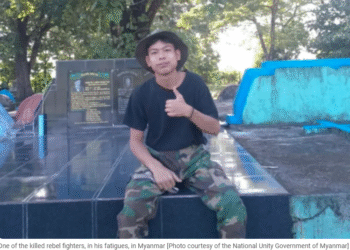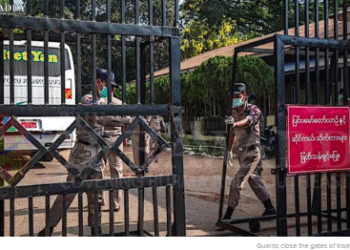The problem is not that governments around the world are unaware of what is happening in Myanmar. It’s that they are not doing nearly enough to stop it.
Since the military seized power in a coup in early 2021, it has terrorised the country, killed, tortured and imprisoned thousands of citizens, broken countless laws, and made a mockery of the UN.
The carnage is unceasing, yet only occasionally does it hit the international headlines. One such moment came in April when the junta bombed the village of Pazigyi, in Sagaing region. More than 160 people, including children, were killed by what Human Rights Watch said was a thermobaric, fuel-air vacuum bomb, followed by helicopter gunship attacks. “The ordnance detonated with deadly impact, ripping the bodies of men, women and children open, turning their skin to ash, and inflicting critical shrapnel wounds,” a UN report said.
Myanmar’s dictator, General Min Aung Hlaing, is as paranoid as he is brutal. He has banned opposition political parties, silenced the media, and jailed the country’s elected leader, Aung San Suu Kyi. An estimated 1.38 million people have been displaced. That’s in addition to hundreds of thousands of Rohingya refugees, victims of what investigators say may be genocide. “Systematic, gross human rights violations, amounting to war crimes and crimes against humanity, [are] being perpetrated daily on the people of Myanmar,” the UN’s special rapporteur declared..
Wanton destruction of Myanmar’s democracy has produced growing, guerrilla-style popular resistance under the umbrella of the People’s Defence Forces, backed by ethnic militias. About 13,000 regime soldiers and police have defected
The result is de facto civil war. The military has lost control of large areas, as we report. A government in exile – the National Unity Government – is trying to rally international support.
The US, the UK and the EU have imposed several rounds of sanctions on the regime, including an arms embargo, but their efforts are undercut by China, Russia, India and others. While condemning the junta, the Asean regional grouping is split – and has proved ineffectual, too.
China could probably stop the killing if it wanted. But it values Myanmar’s natural resources and ports above human rights and democracy. The UN says Beijing has supplied the junta with $254m in arms since the coup.
Russia, whose $400m in weapons sales include the helicopter gunships used to kill the Pazigyi villagers, joins China at the UN to protect the junta from tougher international action.
I hope you appreciated this article. Before you move on, I was hoping you would consider taking the step of supporting the Guardian’s journalism.
From Elon Musk to Rupert Murdoch, a small number of billionaire owners have a powerful hold on so much of the information that reaches the public about what’s happening in the world. The Guardian is different. We have no billionaire owner or shareholders to consider. Our journalism is produced to serve the public interest – not profit motives.
And we avoid the trap that befalls much US media – the tendency, born of a desire to please all sides, to engage in false equivalence in the name of neutrality. While fairness guides everything we do, we know there is a right and a wrong position in the fight against racism and for reproductive justice. When we report on issues like the climate crisis, we’re not afraid to name who is responsible. And as a global news organization, we’re able to provide a fresh, outsider perspective on US politics – one so often missing from the insular American media bubble.
Around the world, readers can access the Guardian’s paywall-free journalism because of our unique reader-supported model. That’s because of people like you. Our readers keep us independent, beholden to no outside influence and accessible to everyone – whether they can afford to pay for news, or not.
Source -The Guardian






